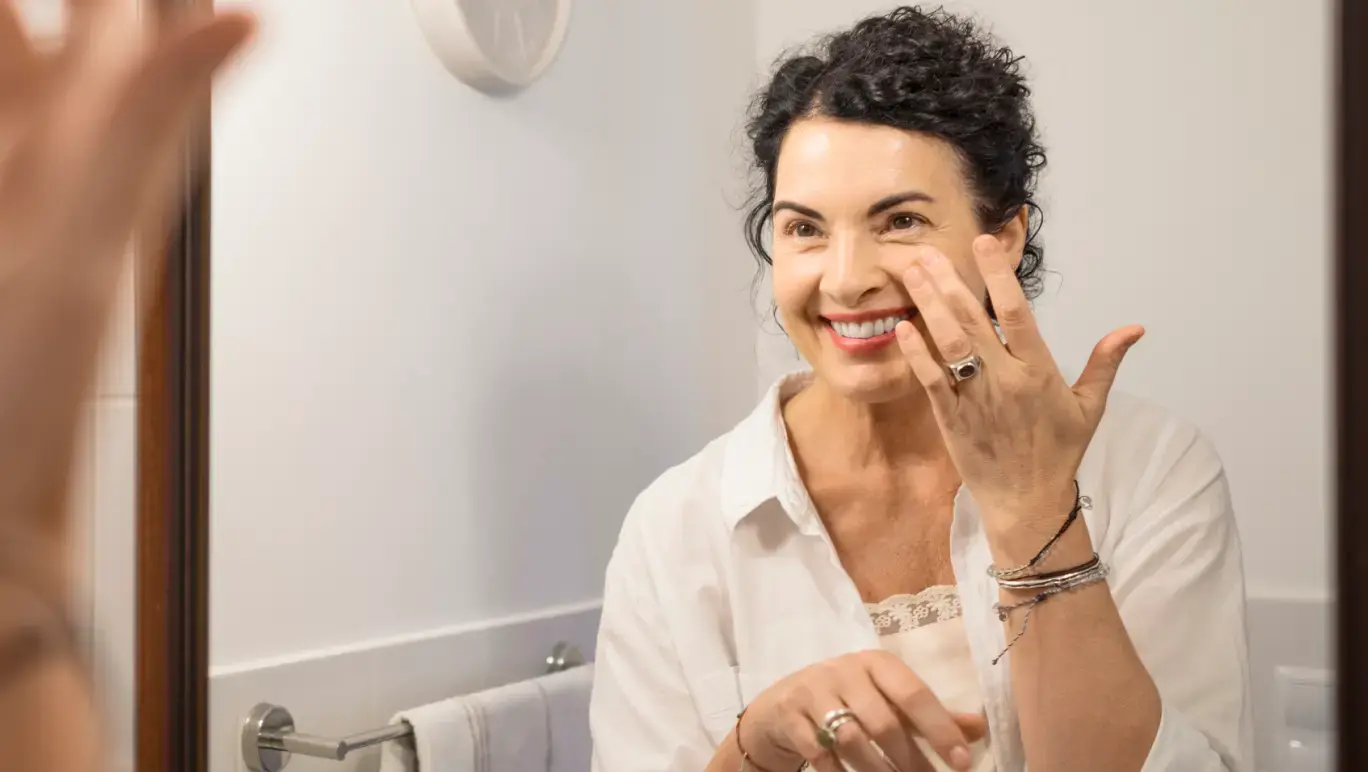How menopause changes your skin and what to do about it

Menopause is a natural transition, but it brings profound changes to the body, especially the skin. Many women notice that their complexion doesn’t behave quite as it once did. From dryness and increased sensitivity to wrinkles and pigmentation, the skin reflects the hormonal shifts happening beneath the surface.
The good news? There are ways you can better support and nourish your skin in this life stage.
Common skin changes in menopause
Women experience a range of symptoms around the menopause transition, and together with the normal processes of ageing, skin changes can be quite troublesome for some. Many changes in the skin can be connected with hormonal shifts, namely a decline in the key hormone oestrogen, which occurs in the menopause transition.
Oestrogen is key to skin health as it promotes the production of collagen and elastin which make the skin more firm, plump and elastic. It also helps support the skin’s moisture balance and barrier function. Other hormones and processes are involved for each specific change in the skin during menopause.
While each woman has a different experience, here are some of the most common skin changes and what you can do about it:
Dryness and itching
The skin loses the ability to hold on to water as well as it used to. This can lead to dryness, itch and irritation. Low levels of oestrogen contributes to a loss of water content as well as thinning of the skin, driven by changes in sebum (natural skin oil) levels. These factors can leave the skin more fragile, sensitive and reactive to irritants.
What can you do?
- Keep the skin well hydrated with a good quality, rich and fragrance-free moisturiser, applied regularly
- Avoid using hot water to wash the skin, and avoid harsh chemicals in skincare products
- Don’t forget to aim for 8-10 glasses of water a day, so you support your skin’s hydration from the inside out
Pigmentation
Hormonal fluctuations can be the cause of dark spots and areas of uneven skin tone on the face, hands and chest. UV damage from the sun can be more significant in this life stage also, as the skin is less able to respond to damage and repair itself.
What can you do?
- For this one, prevention is better than cure. Apply sun protection to reduce the chances of UV damage, which can speed up the pigmentation process. Wear protective clothing and avoid direct sun exposure during peak hours
- Brightening serums and face creams, with ingredients such as vitamin C, niacinamide and retinol may help reduce the appearance of dark spots for some people
Facial redness and flushing
Hot flushes, the most recognised symptom of menopause, happen as the body attempts to cool down due to poor temperature regulation. Women who have frequent hot flushes can experience persistent redness due to capillaries breaking in the face, which can appear like small red lines under the skin surface.
What can you do?
- Try to reduce episodes of hot flushes to avoid the related skin damage.
- Avoid any known triggers for hot flushes, such as caffeine or spicy foods.
- Exercise in cool locations or gyms to avoid the chances of overheating.
- Speak to a doctor, as medical treatments can be helpful for some women to help control hot flushes.
Hormonal acne
Changes in sebum production can lead to acne breakouts due to clogged pores, particularly along the jaw line.
What can you do?
- Use a gentle, non-comedogenic skincare routine (that won’t block the pores), including a mild cleanser
- Your doctor or pharmacist can show you some medicated treatments that may also help
- Higher levels of stress may trigger acne, so see how you can add in some stress-relieving activities like yoga, meditation or mindfulness
Less plump skin
Part of the natural course of ageing leads to thinning of the skin and less elasticity and firmness. Oestrogen plays a vital role in maintaining body collagen, which provides the skin structural support. Accelerated collagen loss in menopause can mean the skin is less firm, elastic and prone to forming deeper wrinkles.
What can you do?
- Looking after the skin, with good quality, natural skin care can help reduce the appearance of fine lines and wrinkles, and boost elasticity and firmness for some women. It may also be worth trying an oral collagen supplement, to help support the skin from the inside.
Facial hair growth
An increase in the relative levels of testosterone in ratio to oestrogen can lead to facial hair growth in menopause. This is most common on the chin and upper lip.
What can you do?
- Temporary hair removal such as waxing or threading offer short-term benefits and need to be repeated regularly
- Hormonal treatments may help with this symptom so speak to a doctor to learn more
When to speak to a doctor?
Hormonal changes associated with menopause can lead to many symptoms. Whether it's for skin changes or other symptoms, you should speak to a doctor to ensure you are supported in this life phase.
In any cases where skin rashes become more serious, or there is associated bleeding, persistent itching, skin tearing or bruising, speak to a doctor. Wounds or lesions that won’t heal should also be assessed.
The bottom line
Menopause related skin changes are common for women in this stage of life. But there are things you can do to support your skin, keep it healthy and to prepare it for what’s ahead. Good quality skincare, together with treatments from your doctor, can go a long way in helping restore healthy skin and alleviate common symptoms.
Reviewed by the Healthylife health experts September 2025.
This article is for informational purposes only and does not provide medical advice, diagnosis, or treatment. Any information published on this website or by this brand is not intended as a substitute for medical advice. If you have any concerns or questions about your health you should consult with a health professional.
